The following are the remarks of Rep. Jamie Raskin to the January 19 hearing of the House Select Committee on January 6, recommending criminal and civil referrals of former President Donald Trump, John Eastman and others to the Department of Justice. -- moderator
Rep. Jamie Raskin: Thank you Mr. Chairman, and I want to thank you for your extraordinary leadership of this committee. Generations to come will praise you and the vice chair for your unswerving devotion to the rule of law.
Several months ago you tasked several members in a subcommittee with bringing to the full committee recommendations about potential referrals to the Department of Justice and other authorities evidence of civil and criminal offenses that have come to our attention over the course of our investigation. We are now prepared to share those recommendations today.
Mr. Chairman, let me begin with some relevant background considerations to our criminal referrals. The dangerous assault on our constitutional democracy that took place on January 6, 2021, consists of hundreds of individual criminal offenses. Most such crimes are already being prosecuted by the Department of Justice. We propose to the committee advancing referrals where the gravity of the specific offense, the severity of its actual harm and the centrality of the offender to the overall design of the unlawful scheme to overthrow the election compel us to speak. Ours is not a system of justice where foot soldiers go to jail and the masterminds and ringleaders get a free pass.
Mr. Chairman, as you know our committee had the opportunity last spring to present much of our evidence to a federal judge, something that distinguishes our investigation from any other congressional investigation I can recall. In the context of resolving evidentiary privilege issues of the crime fraud doctrine in the Eastman case, US District Court Judge David Carter examined just a small subset of our evidence to determine whether it showed the likely commission of a federal offense. The judge concluded that both former President Donald Trump and John Eastman likely violated two federal criminal statutes. This is the starting point for our analysis today.
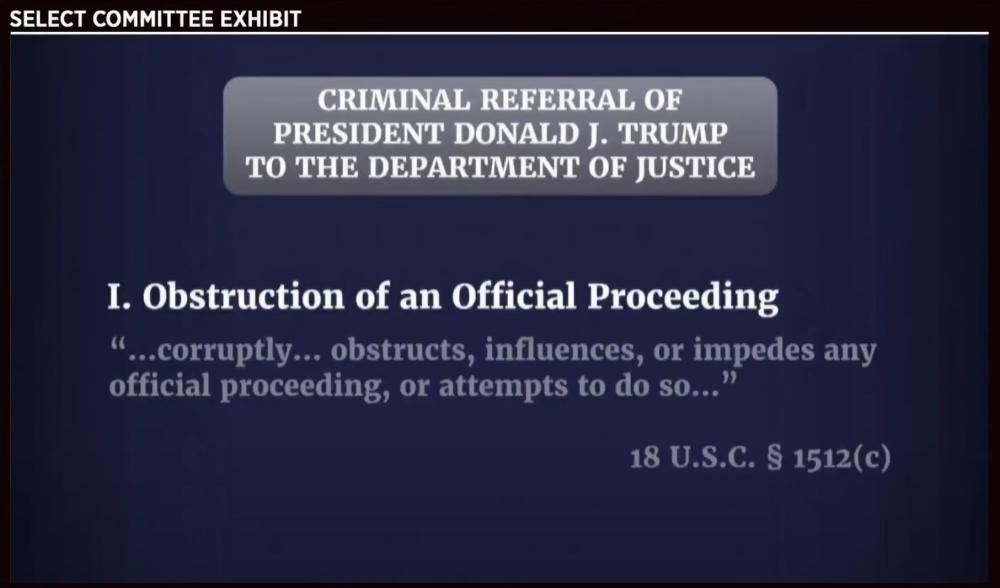
The first criminal statute we invoke for referral therefore is Title 18 Section 1512(c) which makes it unlawful for anyone to corruptly obstruct, influence or impede any official proceeding of the United States government. We believe that the evidence described by my colleagues today and assembled throughout our hearings warrants a criminal referral of former President Donald J. Trump, John Eastman and others for violations of this stature.
The whole purpose and obvious effect of Trump’s scheme were to obstruct, influence and impede this official proceeding – the central moment for the lawful transfer of power in the United States.
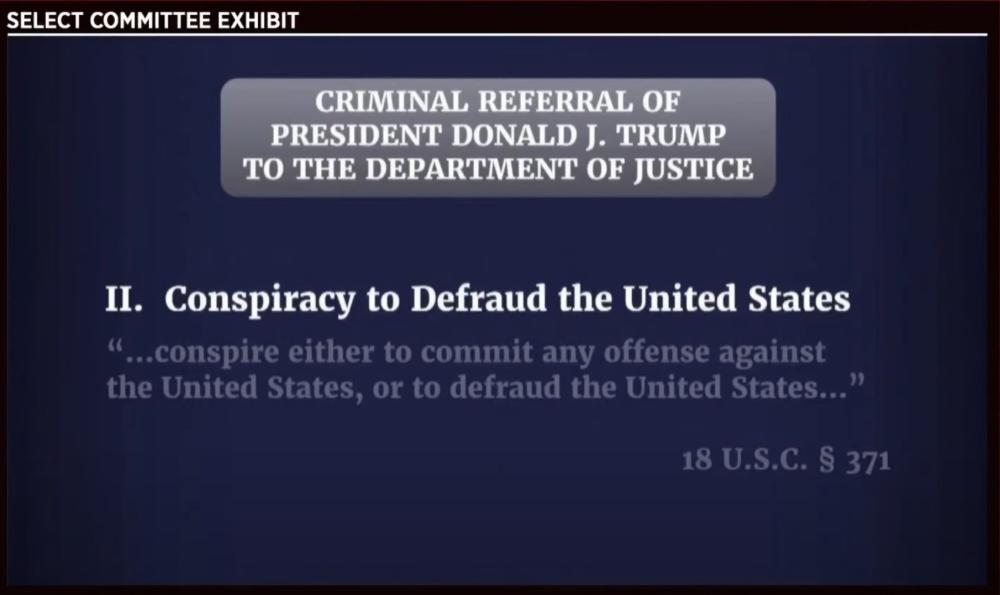
Second, we believe that there is more than sufficient evidence to refer former President Donald J. Trump, John Eastman and others for violating Title 18 Section 371. This statute makes it a crime to conspire to defraud the United States. In other words, to make an agreement to impair, obstruct or defeat the lawful functions of the United States government by deceitful or dishonest means. Former President Trump did not engage in a plan to defraud the United States acting alone. He entered into agreements, formal and informal, with several other individuals who assisted him with his criminal objectives. Our report describes in detail the actions of numerous co-conspirators who agreed with and participated in Trump's plan to impair, obstruct and defeat the certification of President Biden's electoral victory.
That said, this subcommittee does not attempt to determine all of the potential participants in this conspiracy, as our understanding of the role of many individuals may be incomplete even today because they refused to answer our questions. We trust that the Department of Justice will be able to form a far more complete picture through its own investigation.
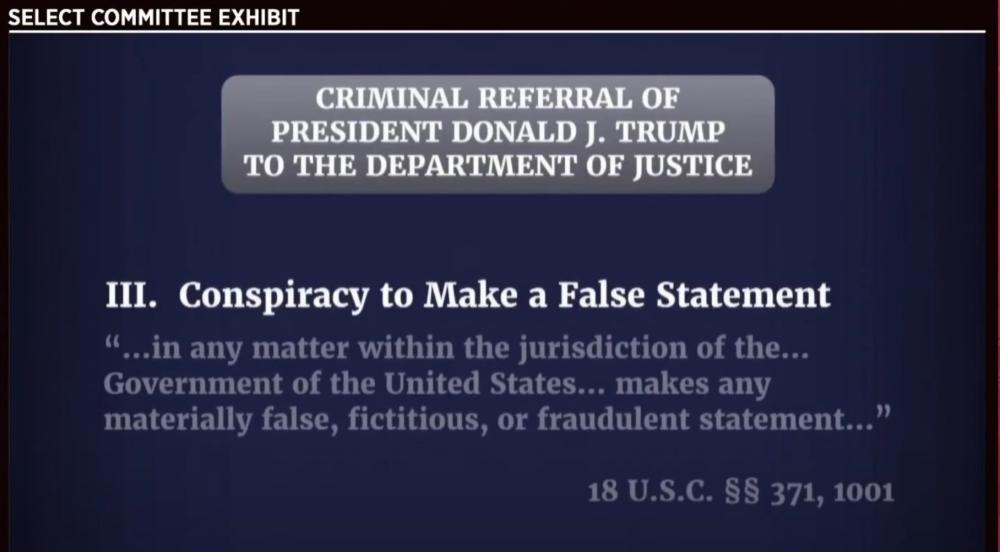
Third, we make a referral based on Title 18 Section 1001 which makes it unlawful to knowingly and willfully make materially false statements to the federal government. The evidence clearly suggests that President Trump conspired with others to submit slates of fake electors to Congress and the National Archives. We believe that this evidence we set forth in our report is more than sufficient for a criminal referral of former President Donald J. Trump and others in connection with this offense. As before, we don't try to determine all of the participants in this conspiracy, many of whom refused to answer our questions while under oath. We trust the Department of Justice will be able to form a more complete picture through its own investigation.
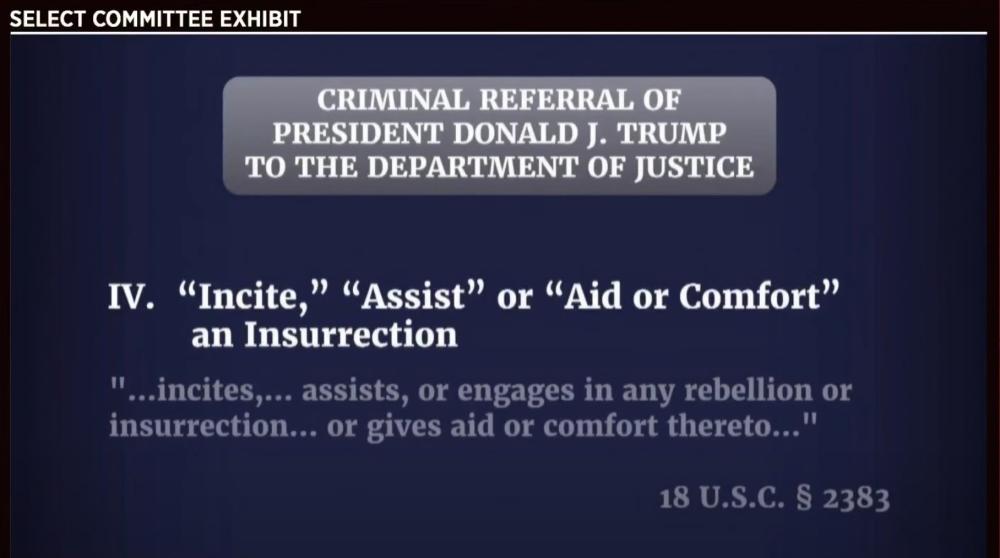
The fourth and final statute we invoke for referral is Title 18, Section 2383. The statute applies to anyone who incites, assists or engages in insurrection against the United States of America and anyone who gives aid or comfort to an insurrection. An insurrection is a rebellion against the authority of the United States. It is a grave federal offense anchored in the Constitution itself, which repeatedly opposes insurrection and domestic violence and indeed uses insurrection by office holders as automatic grounds for disqualification from ever holding public office again at the federal or state level.
Anyone who incites others to engage in rebelling, assists them in doing so or gives aid and comfort to those engaged in insurrection is guilty of a federal crime. The committee believes that more than sufficient evidence exists for a criminal referral of former President Trump for assisting or aiding and comforting those at the Capitol who engaged in a violent attack on the United States. The committee has developed significant evidence that President Trump intended to disrupt the peaceful transition of power under our Constitution.
The president has an affirmative and primary constitutional duty to act to take care that the laws be faithfully executed. Nothing could be a greater betrayal of this duty than to assist in insurrection against the constitutional order. The complete factual basis for this referral is set forth in detail throughout our report.
These are not the only statutes that are potentially relevant to President Trump’s conduct related to the 2020 election. Depending on evidence developed by the Department of Justice, the president's actions could certainly trigger other criminal violations.
Nor are President Trump and his immediate team the only people identified for referrals in our report. As part of our investigation, we asked multiple members of Congress to speak with us about issues critical to our understanding of this attack on the 2020 election and our system of constitutional democracy. None agreed to provide that essential information. As a result, we took the significant step of issuing them subpoenas, based on the volume of information particular members possessed about one or more parts of President Trump’s plans to overturn the election. None of the subpoenaed members complied, and we are now referring four members of Congress for appropriate sanction by the House Ethics Committee for failure to comply with lawful subpoenas.
Mr. Chairman, we understand the gravity of each and every referral we are making today, just as we understand the magnitude of the crime against democracy that we describe in our report. But we have gone where the facts and the law lead us and inescapably they lead us here. Accordingly Mr. Chairman and in light of these facts, I asked unanimous consent that the chairman be directed to transmit to the United States Department of Justice relevant select committee records in furtherance of these criminal referrals.
Committee Chair Bennie Thompson: Without objection, so ordered.

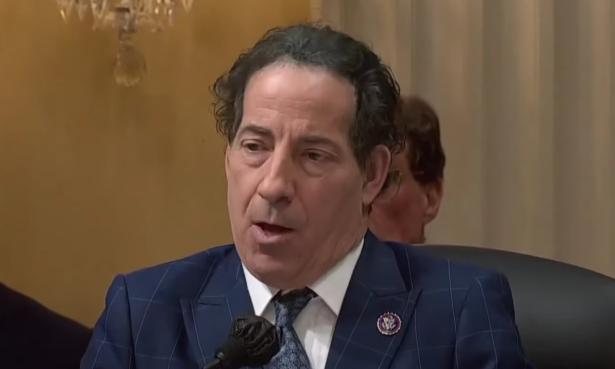
Spread the word